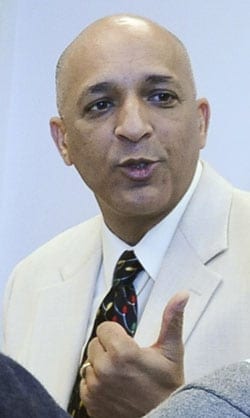
LAWRENCE, Mass. — When William “Willie” Lantigua was elected mayor of Lawrence in 2009, he stood in front of supporters and sang Hector Lavoe’s “Mi Gente” — “My People.” Supporters in this majority Latino city danced, cried and listened to the first Latino to be elected mayor in state history declare through a bullhorn that he’d be a mayor of “all Lawrence residents.”
His victory attracted international attention, prompting a visit from the first lady of the Dominican Republic.
Now observers say he’s fighting for his political life and some residents want the Dominican-born Lantigua recalled.
That’s because recent news stories have reported that Lantigua is a target of an FBI investigation of alleged corruption, although the FBI won’t comment and Lantigua says he has not been contacted by federal agents. He has also come under fire from the city’s police and fire departments over cuts and layoffs.
Then last month, an outspoken critic of Lantigua was allegedly beaten at a fried chicken restaurant by a nightclub bouncer.
And last week Lantigua was forced to apologize after his live-in girlfriend, who also works for the city, acknowledged that the condo they now share had received an undisclosed amount of federal assistance for heating. The mayor, who makes around $100,000 a year, said the federal program would be reimbursed.
“Lantigua really needs a PR firm,” said Richard Padova, a Northern Essex Community College history professor who follows Lawrence politics. “But the city is too broke to afford it.”
For his part, Lantigua, a former state representative, remains defiant and still enjoys celebrity status among his strongest supporters who defend him on Spanish-language radio despite recent developments.
“A lot of people don’t like the fundamental changes that we are making,” Lantigua said in a recent interview with The Associated Press in his office. “So they are attacking me and want me out. But I’m not going anywhere, brother.”
Lantigua, who rarely speaks with English-language media, blames all the negative press around his first year and five months in office on his desire to reform City Hall. He said it’s diverting attention from the improvements he’s made, from cleaning the streets to persuading baking company J.S.B. Industries of Chelsea to invest $12 million in baking facilities in Lawrence.
Other changes, Lantigua said, include helping get the city’s finances in order upon taking office in a city saddled with a multimillion-dollar deficit. Last year, state lawmakers approved a plan to allow Lawrence, a city of 71,000 and one of the poorest in the state, to borrow $35 million and have an appointed overseer monitor the finances.
Lantigua said he wanted to take it a step further and require his approval for all expenses and overtime more than $1,000. That has resulted, he said, in uncovering patterns of abuse where some city workers who work as little as 15 minutes outside their schedules charge the city for four hours under current union rules, he said.
In addition, Lantigua’s budget last year required that around a dozen police officers be demoted to save jobs and that the department cut 40 positions. “Those moves actually saved some positions and helped us bring them back,” he said.
Still, those decisions have drawn scorn from unions and critics who charge that Lantigua is micro-managing city affairs.
“It feels like a Third World country,” said Antonio Arevalo, 44, the critic who was beaten at the fried chicken restaurant and unsuccessfully tried to obtain a restraining order against Lantigua earlier this year. “He controls everything.”
Arevalo was critical of Lantigua for frequently visiting the city’s many nightclubs and said he’s met with federal authorities and provided photos of the mayor at those clubs.
Lantigua brushed off Arevalo’s charges and challenged him or anyone else to produce any evidence of wrongdoing. “So I go to clubs. Big deal,” said Lantigua. “I’m not doing anything wrong or illegal. People just keep throwing lies out there and they keep getting published. I’m focusing on making this city great.”
Lantigua said he actually prompted a federal investigation himself into the city’s Information Technology Department over concerns of billing irregularities.
Meanwhile, after the July 2010 police department cuts, overall crime in the city has surged 46 percent, according to police statistics. Specialized units were dismantled and officers are “now reacting to crimes instead of being proactive in preventing crimes,” said John Romero, the city’s police chief. Yet Romero did not want to put blame on any decisions by Lantigua.
“I don’t want to talk about why and how we got here,” said Romero. “But we are here.”
Abel Salas, 28, said he thinks the media has been unfair to Lantigua, especially since he inherited a number of problems. “I think the mayor is not doing as bad as people say,” said Salas, who did not vote for Lantigua. “He’s done a decent job as an administrator.”
That’s not stopping some residents in pushing a recall effort to remove Lantigua from office. A group called “It’s Your Right” is attempting to gather signatures on an affidavit and then signatures on a petition of at least 15 percent of city voters from the last election as required by city ordinance.
If those efforts are successful, Lantigua would have five days to resign, or City Council would order an election within 60 days asking voters whether he should be removed from office.
However, Padova called that plan a long shot. “Lantigua is down, but he’s not out,” said Padova. “He can recover.”
Salas said those familiar with Lawrence politics know that the controversies surrounding Lantigua are nothing new in a city where a former schools superintendent is facing trial for fraud and embezzlement and a city councilor was charged with intentionally rear-ending a car of her husband’s girlfriend.
“It may be a new episode of the plot, yet the sitcom is the same,” said Salas. “People here hate the fact that it’s happening but love to watch it.”
Associated Press






